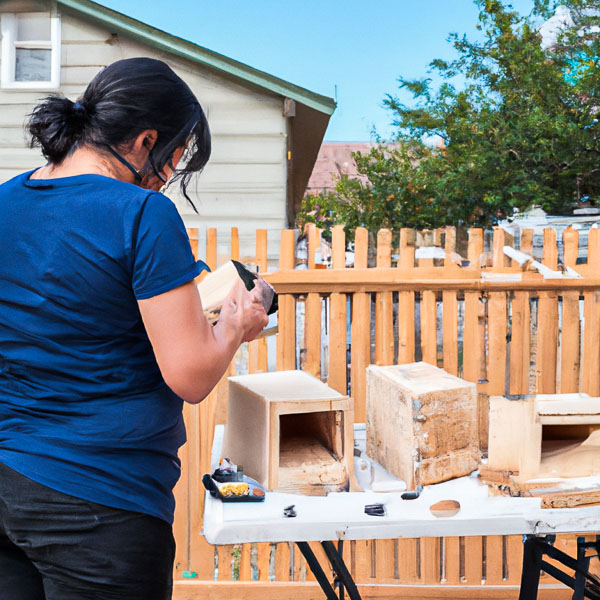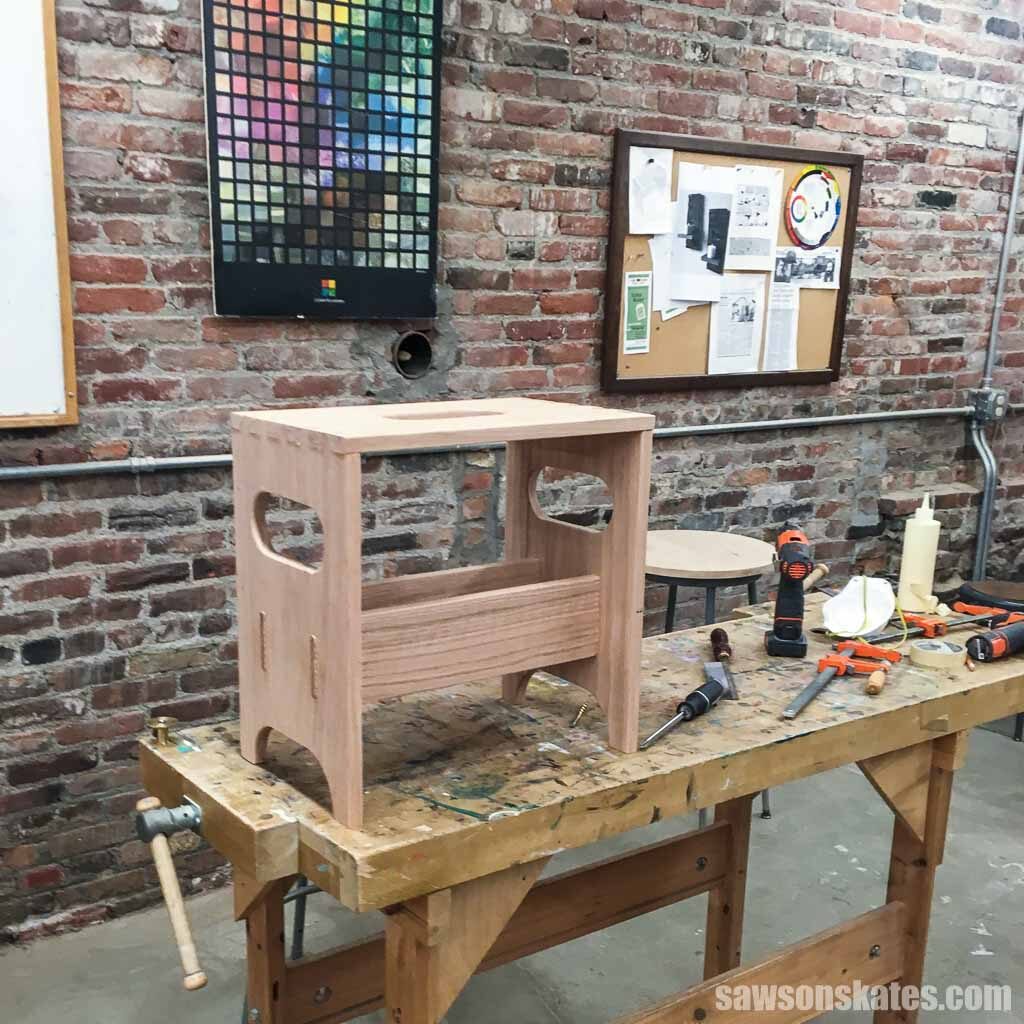Looking to pursue your woodworking passion but don’t have a shop readily available? No worries! You might be surprised to discover that there are plenty of places where you can woodwork without a traditional shop set up. In this article, we’ll explore creative alternatives and unconventional spaces that can cater to your woodworking needs. So, let’s find out where you can unleash your woodworking skills without a shop!
Whether you lack the space, budget, or resources for a dedicated workshop, there’s no need to slow down your woodworking journey. Sometimes, all it takes is a little out-of-the-box thinking to transform ordinary spaces into functional work areas. So, if you’re eager to dive into woodworking but don’t have a traditional workshop at your disposal, keep reading!
From community centers and makerspaces to shared workshops and even your own backyard, the options for woodworking without a shop are more diverse than you might think. In the following paragraphs, we’ll uncover several exciting places where you can pursue your woodworking passion and bring your craft to life. Let’s explore the possibilities together!

Where to Woodwork Without a Shop: Creative Solutions for DIY Enthusiasts
Woodworking is a beloved hobby for many, but not everyone has access to a dedicated woodworking shop. However, lack of space or resources should not hinder your creativity and passion for woodworking. In this article, we will explore various innovative options and alternative locations where you can pursue woodworking projects and hone your skills. Whether you live in a small apartment or don’t have the funds to set up a dedicated shop, there are plenty of alternatives available to unleash your woodworking talents.
Workshops and Maker Spaces: Embracing the Community
One popular option for those looking to woodwork without a shop is to join a workshop or a maker space. These spaces provide a communal environment where members can share tools, resources, and knowledge. They are equipped with a wide range of woodworking tools, allowing you to undertake projects that would otherwise be impossible in a small home setting. Additionally, you’ll have the chance to interact and collaborate with fellow woodworkers, gaining valuable insights and fostering a sense of community.
Benefits of Joining a Workshop or Maker Space
By joining a workshop or maker space, you can enjoy several advantages. Firstly, you gain access to a wide array of professional-grade tools and equipment without the need to invest in costly purchases. This allows you to experiment with different techniques and tackle more complex projects. Secondly, the workshops often offer classes and workshops where you can learn new skills or improve existing ones. The collective knowledge and expertise of the community will accelerate your woodworking journey. Lastly, being part of a woodworking community gives you ample opportunities to collaborate on projects, exchange ideas, and receive feedback, thus expanding your horizons as a woodworker.
Tips for Finding a Workshop or Maker Space
When searching for a workshop or maker space, consider factors such as location, membership fees, accessibility of tools, and the size and diversity of the community. Look for spaces that offer wood-specific areas or dedicated woodworking studios. Local colleges, community centers, or recreational centers often host maker spaces or woodworking workshops. Online directories and platforms like Meetup can also help you connect with like-minded individuals and find suitable spaces. Make sure to visit and evaluate different options before committing to a membership to ensure that the workshop meets your needs and provides a comfortable and inspiring environment for your woodworking endeavors.
Key Takeaways: Where to Woodwork Without a Shop?
- Set up a workspace in your garage or backyard.
- Join a community woodworking workshop or makerspace.
- Utilize local resources like community centers or schools.
- Consider renting a small storage unit for your woodworking projects.
- Explore the option of mobile woodworking tools and equipment.
Frequently Asked Questions
Looking to woodwork but don’t have a shop? Here are some commonly asked questions to help you find the perfect alternative:
1. Can I woodwork without a dedicated shop space?
Absolutely! Even without a dedicated shop space, you can still pursue your woodworking hobby. Consider utilizing a spare room, garage, or even a shed as your makeshift workshop. Clear out the space, organize your tools, and create a functional layout. You may need to be creative with storage solutions and workspace arrangements, but it’s definitely possible to woodwork without a dedicated shop.
In addition, you can look into community workshops or makerspaces that offer shared facilities and tools for woodworking enthusiasts. These spaces often provide access to various tools, equipment, and a supportive community of fellow woodworkers.
2. What are some alternative locations for woodworking?
If you don’t have access to a dedicated woodworking shop, consider exploring alternative locations such as:
– Outdoor spaces: Utilize your backyard, patio, or any well-ventilated outdoor area where you can set up a temporary workspace. Ensure you have proper protection from the elements when working outdoors.
– Community centers: Some community centers offer woodworking facilities and workshops that you can utilize. Check with your local community center or adult education facilities for availability and requirements.
– Local woodworking guilds: Joining a local woodworking guild can grant you access to shared facilities and workshops that you can use for your projects.
– Maker fairs and festivals: Look for maker fairs or woodworking festivals in your area where you can connect with other woodworkers, learn new techniques, and potentially find access to shared workshop spaces.
3. What tools are essential for woodworking without a shop?
When woodworking without a dedicated shop, it’s important to have a compact set of essential tools. Some of these tools include:
– Hand tools: Invest in quality hand tools such as chisels, hand saws, planes, and clamps. These versatile tools can accomplish a wide range of woodworking tasks.
– Portable power tools: Opt for portable power tools like a compact circular saw, a cordless drill, and a random orbital sander. These tools can easily be transported and used in different locations.
– Workbenches and sawhorses: Portable workbenches and adjustable sawhorses are handy for creating a stable and elevated work surface wherever you’re woodworking.
– Storage and organization: Since space is limited, invest in efficient storage solutions like toolboxes and wall-mounted racks to keep your tools organized and easily accessible.
4. Are there any safety concerns to consider when woodworking without a shop?
When woodworking outside of a dedicated shop, there are a few safety considerations to keep in mind:
– Ventilation: Ensure good ventilation when using finishes, adhesives, and other chemicals. Work in well-ventilated areas or use fans to circulate fresh air.
– Eye and ear protection: Always wear safety goggles or glasses to protect your eyes from flying debris. Use earplugs or earmuffs to protect your hearing when using power tools.
– Dust collection: Woodworking creates dust, so consider using a dust mask or a respirator to protect your lungs. Clean up your workspace regularly to minimize dust accumulation.
– Fire safety: Be aware of fire hazards, especially when using flammable finishes or operating power tools near combustible materials. Keep a fire extinguisher nearby and follow proper safety protocols.
5. How can I optimize a small woodworking space?
With limited space, optimizing your woodworking area is crucial. Here are some tips:
– Compact tools: Choose tools with a smaller footprint or consider investing in multi-functional tools to save space.
– Mobile workstations: Utilize mobile workstations or rolling carts that provide additional storage and can be moved around as needed.
– Wall-mounted storage: Maximize vertical space by installing wall-mounted storage solutions such as pegboards, shelves, or cabinets to keep your tools organized and within reach.
– Utilize every inch: Make use of all available space, including the ceiling, for storage. Install hooks or racks to hang tools or lumber, or create overhead storage shelves.
– Keep it tidy: Regularly clean and declutter your workspace to maintain an organized and efficient woodworking area.

5 Ways to Start Woodworking NOW!
Summary
If you’re a 13-year-old who wants to woodwork but doesn’t have a shop, don’t worry! There are still options for you. You can start by using your garage, basement, or even your backyard as a makeshift workshop. Just make sure to have adult supervision and follow safety rules.
Another idea is to find a community workshop or makerspace in your area. These places provide tools and space for people to work on their projects. Plus, you might even get the chance to learn from experienced woodworkers and meet other like-minded individuals.
Remember, you don’t need a fancy shop to start woodworking. With a little creativity and resourcefulness, you can pursue your passion for woodworking wherever you are!
